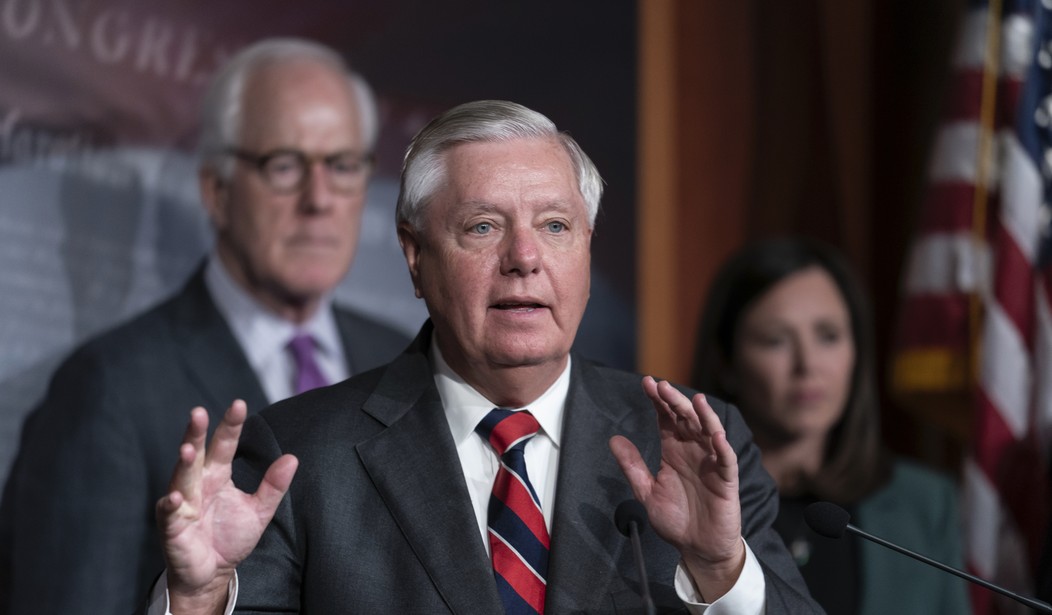Some in the U.S. Senate stayed up way past their bedtimes on Friday night, voting into the wee hours in a battle against mainly Democrat amendments attempting to derail President Donald Trump's agenda before managing to pass a budget plan.
After the six-hour vote-a-rama ended, the legislation passed nearly along party lines, with "no" votes from Sens. Rand Paul (R-KY) and Susan Collins (R-ME), 51-48, around 2:30 a.m. Eastern time on Saturday morning.
Here is what we know so far about the plan:
On paper, the new Senate budget outline allows for $1.5 trillion in tax cuts, a seemingly modest amount. But that figure disguises an additional $3.8 trillion for extending the 2017 tax cuts that Senate Republicans also want to include in the bill, which they argue should not show up as a cost on the federal balance sheet.
The 2017 tax cuts are scheduled to expire at the end of the year, so an extension must be included in their bill, but Republicans have said that they will steer around budget rules and declare the move cost-free. The real size of the tax cut envisioned in the Senate outline is therefore roughly $5.3 trillion over a decade, with $1.5 trillion available for new tax cuts like Mr. Trump’s proposal to not tax tips. That is far larger than the $4.5 trillion House Republicans have given themselves.
Then there's this:
...With additional spending on defense and immigration, and minimal spending cuts, the Senate resolution could add roughly $5.7 trillion to the debt over the next 10 years. It calls for a $5 trillion increase in the debt limit, compared with the $4 trillion increase in the House plan. And House Republicans are pursuing deep spending cuts aimed at keeping the cost of their overall package to $2.8 trillion.
Before the Upper chamber voted, Senate Majority Leader John Thune called the plan "the first step toward a final bill to make permanent the tax relief we implemented in 2017 and deliver a transformational investment in our border, national and energy security."
The question now is: what is the likelihood of reconciliation with the budget House Republicans have already laid out? So far, those waters look choppy.
Read related: BREAKING: House Takes Critical Vote on Budget CR
One member concerned about what Senate Republicans approved overnight is House Budget Committee Chair Jodey Arrington (R-Texas), who released a statement in an X post:
Chairman @RepArrington’s statement in response to the Senate’s amendment to the House-passed budget resolution: pic.twitter.com/vR6pse8VA1
— House Budget GOP (@HouseBudgetGOP) April 5, 2025
"In order to bring down prices and restore fiscal sanity in Washington," he wrote, "President Trump has been working at warp speed to root out wasteful and fraudulent spending, right-sizing the federal bureaucracy, and pushing Congress to balance the federal budget."
He continued, explaining that "[t]he House followed suit by sending the Senate a fiscally responsible budget resolution, that included the entirety of President Trump's America First agenda."
Rep. Arrington said the resolution includes "pro-growth tax cuts, border and defense funding, deregulation, American energy production, and enforceable spending cuts that would reduce our nation's debt-to-GDP putting our budget on a path to balance."
Then he turned to the Senate's plan, calling it out as "unserious and disappointing," as he believes it contains two major problems: first, the Grand Canyon-sized gap between House and Senate on how much each body is proposing to raise the debt limit, along with the larger price tag envisioned by the Senate.
The second problem relates to how Pres. Trump's first-term tax cut is figured in:
The Texas lawmaker also took a shot at Senate Budget Committee Lindsey Graham’s (R-S.C.) plan to score the cost of extending Trump’s 2017 tax cuts as not adding future federal deficits, something Graham would achieve by judging an extension of those cuts on a “current policy” baseline.
He said the blueprint “sets a dangerous precedent by direct scoring tax policy without including enforceable offsets.”
Also pushing back on the Senate's legislation is Freedom Caucus member Rep. Chip Roy (R-Texas), who also released a statement on X. In it, he said that “[i]f the Senate’s ‘Jekyll and Hyde’ budget is put on the House floor, I will vote no,” calling their plan "a path to failure."
House GOP leaders, however, are urging caucus members to pass the Senate's plan:
In a “Dear Colleague” letter sent to members on Saturday, Speaker Mike Johnson (R-La.), House Majority Leader Steve Scalise (R-La.), House Majority Whip Tom Emmer (R-Minn.), and Conference Chair Lisa McClain (R-Mich.) are getting a head start on arguing in favor of the legislation as hardline conservative publicly balk at the Senate product.
“Adopting the Senate’s amendment to the House resolution will allow us to finally begin the most important phase of this process: drafting the reconciliation bill that will deliver on President Trump’s agenda and our promises to the American people,” they wrote in the letter.
This is a developing story. RedState will provide updates as they become available.
Every single day, here at RedState, we will stand up and FIGHT, FIGHT, FIGHT against the radical left and deliver the conservative reporting our readers deserve.
Help us continue to the truth about the Trump administration and its major wins. Join RedState VIP and use promo code FIGHT to get 60% off your membership.












Join the conversation as a VIP Member